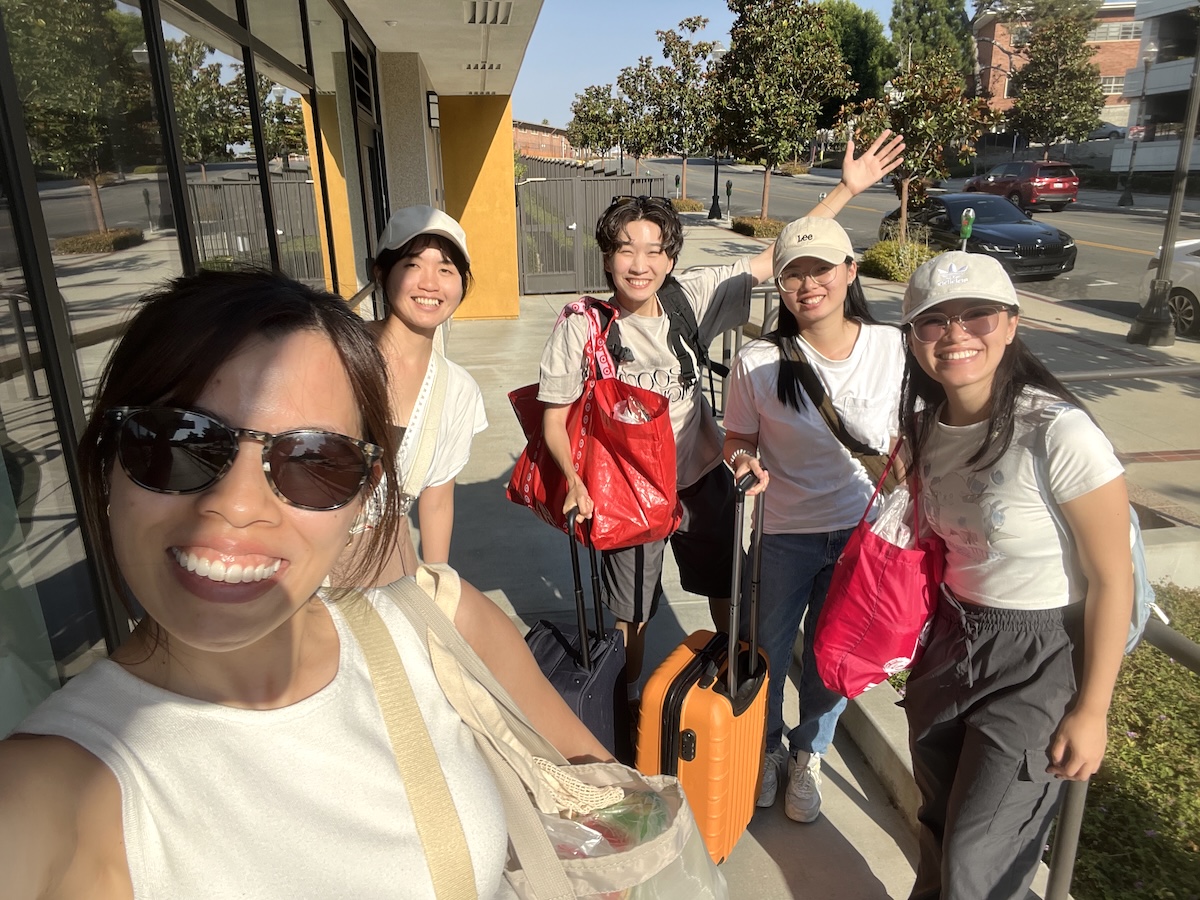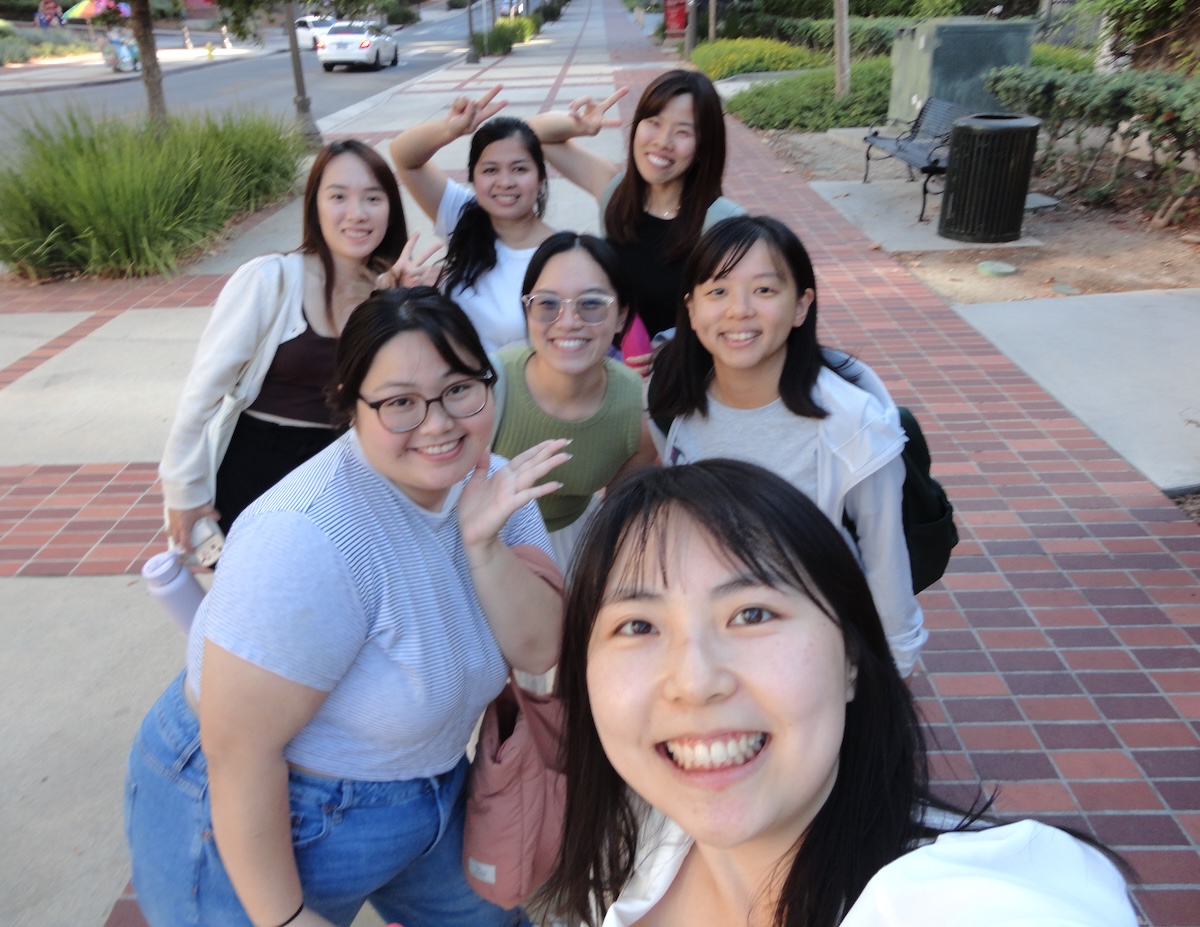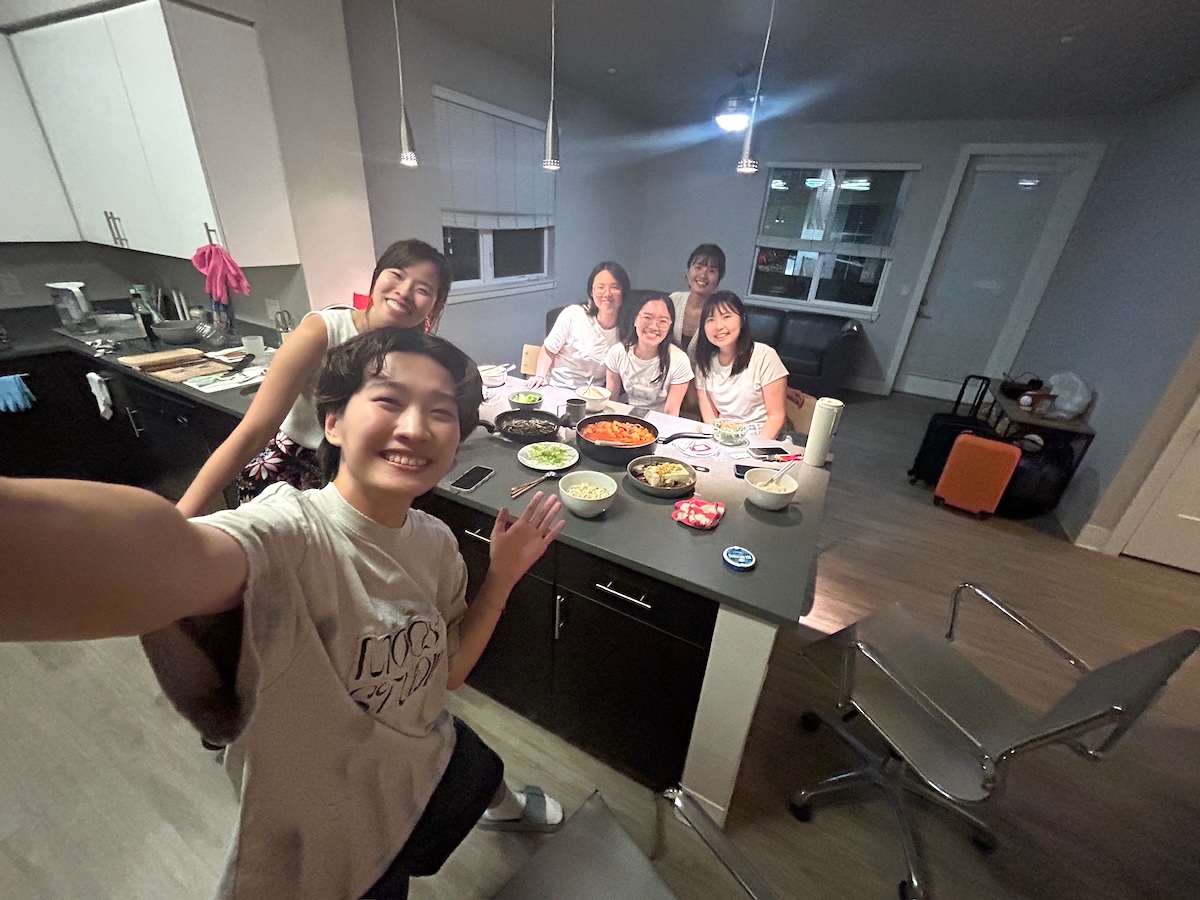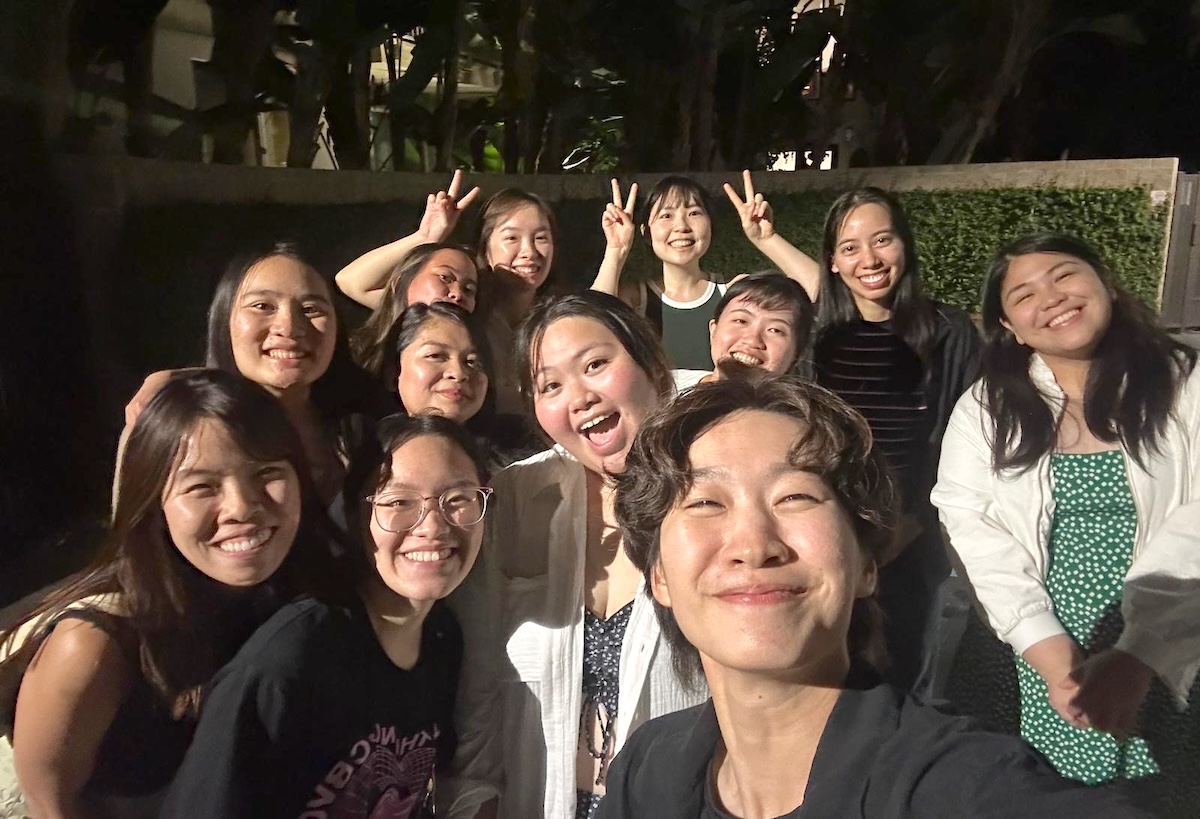Student Blog
Life Hacks
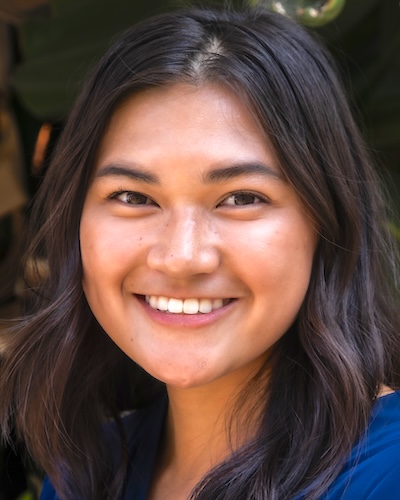
Grad Application . . . Let’s Talk About It ⟩
December 18, 2024, by Cara
Admissions Life Hacks
Since deciding to pursue a career in OT, I knew that graduate school would be an eventual part of my academic journey. I’ve recently finished the graduate school application process and while it’s fresh in my mind, I have some tips to share!
1. Choosing Programs — What Do You Want Out of It?
When selecting a program, it’s important to consider what you want to gain from the experience. Each program is unique in its own way, so here are some factors I considered when choosing the right fit for me:
- Curriculum
Does the program offer a good balance between theory and clinical work? Think about whether you want to understand more of the theoretical foundations of what you’re doing, or if you’re someone who prefers to jump into clinical work and learn as you go. - Opportunities
What resources does the program offer? Look into opportunities beyond lab and fieldwork, such as community clinics where you can gain experience early on. Additionally, research the fieldwork placements — are they local or global? - Diversity
As OT helps people from various backgrounds, consider a program that values diversity. Research how diverse the student body, faculty, and the community outreach are. Exposure to different perspectives in your cohort helps you grow your empathy and awareness. And with the guidance of faculty across diverse subjects, you’ll learn the necessary skills to help people holistically.
2. Observation / Volunteer Experience
Some programs may require 40–80 hours of relevant experience, which may seem daunting, but it’s totally doable! I gained mine by networking through family friends and reaching out to clinics I found through Google. Even if experience is optional, I strongly encourage you to still do it. Such experiences helped me see all the ways I can make a difference as an OT, discovering the settings and specialties that resonated most with me, and reaffirmed my passion for the field. If you’re unsure where to start, check out our list of volunteer and observation opportunities across the US and internationally.
3. Letters of Recommendation
Most OT programs require three letters of recommendation from a professor, an OT you’ve shadowed or interned with, and an employer. It’s important to be intentional about who you ask and what they can add to your application. For example, my professor emphasized my work ethic, compassion, and introspection. An OT I shadowed focused on my time alongside them and how I was as their shadow. My employer commented on my creativity, communication, dependability, and teamwork skills, drawing from my role as a Student Ambassador. In short, don’t select recommenders solely based on their titles — consider how each can showcase different aspects of your strengths to make yourself a more well-rounded applicant.
4. Personal Statement
Writing a personal statement is undeniably one of the most challenging yet vital parts of the application process. While it’s easy to think you need to fit an “ideal student mold”, remember that programs value individuality. Unlike most applicants, I never had a direct experience with OT that inspired me to pursue the career. Rather, my “aha” moment was from my former job as an elementary after-school aide. While not directly related to OT, I was able to reflect on this experience to demonstrate essential OT principles such as empathy, problem-solving, and supporting others in overcoming challenges. Often, the experiences that seem trivial or we initially take for granted teach us the most about who we are and what we’re meant to do. So, don’t underestimate those unique experiences — they may provide the most meaningful insights into what you can offer to the field.
5. Interview
Interviews are a double-edged sword. I was excited when I got one, thinking, “Yes, I’ve made it to the next round!” But then the anxiety kicked in – What kind of questions would they ask? What if I blanked out completely? What if I say the wrong thing? Here’s how I overcame the jitters:
- Prepare
Anticipate common interview questions, including why you chose OT, why you chose that specific program, and experiences about teamwork and problem-solving. Some programs may even have you role-play as an OT to assess your empathy and communication skills. - Mock interviews
As they say, “practice makes perfect!” I suggest doing mock interviews with those experienced in the process, like professors or TAs. For me, I prepared with my dad, thanks to his extensive experience on hiring committees. I admit that I cried three times out of nerves (haha!). Nevertheless, by the day of the actual interview, I made it through without any tears. Also, some programs provide the opportunity to virtually meet with the admissions director to answer any questions you may have. If offered, I suggest taking it, as it helped me get a better sense of what the school was looking for and allowed the program to familiarize themselves with me. - Ask questions
As my dad advised me, “Don’t stay silent — you might miss your shot.” While it may sound blunt, speaking up by asking questions shows you’re invested in the program while helping you determine if it’s the right fit. Most interviews include a Q&A with current graduate students, giving you a chance to learn candidly about the program’s strengths and weaknesses. Ask about what’s important to you, whether it’s student-student support, student-faculty relationships, fieldwork, or capstone projects. Remember, there’s no such thing as a stupid question! - Relax
During the actual interview, remember that the interviewer is there to get to know you, not to judge you. It’s easy to get caught up in thoughts like, Do I have enough experience? or This program is so prestigious — am I good enough? But, remember you earned the chance to be there, and that says a lot about you having something valuable to offer. Take a deep breath and know that you can do this, because you can.
The application process can be daunting, and perfectionism often makes it feel even more stressful. I overthought a lot, but I had to remind myself that getting through it is better than perfect, and that everything will fall into place as it’s meant to. Even when it feels uncertain, remember, it’s not about where you are now, but who you’re becoming along the way. I hope these tips help you feel more prepared and confident as you approach application season. If you ever want to talk more about the process, feel free to reach out. Good luck!
⋯
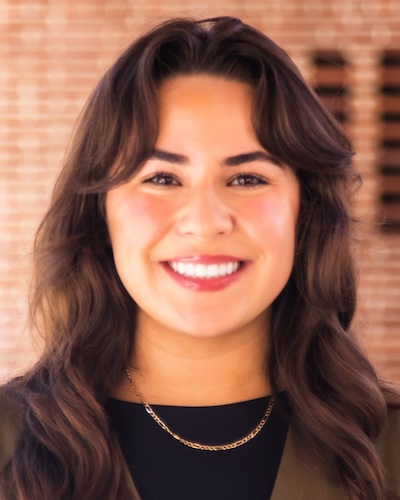
Connecting with OTs ⟩
November 16, 2024, by Kimberly Rochin
Community Life Hacks
Let’s face it: occupational therapy is an incredible field that’s evolving and expanding daily. The beauty of OT lies in its versatility, allowing therapists to address patient needs at every life stage and in almost any environment. Yet, with so many specialties and settings, it’s hard not to feel a bit of F.O.M.O.
That’s where building connections comes in. Networking with other professionals in the OT community can open up insights that enrich our learning. I’ll share practical tips and strategies for connecting with professionals that worked best for me!
1. Do Your Homework
Before reaching out, take a few minutes to learn about the person. Knowing a bit about their background and interests shows that you’re genuinely interested and can help you connect more meaningfully. Some great platforms are LinkedIn, the individual’s affiliated organization (for example, clinics or hospitals), or even just a quick Google Search. You don’t need to know ALL the information about them; you can just bounce back from a few pointers.
2. Be Intentional
Make your outreach purposeful. Think about what you hope to gain from the connection (e.g., insight into a specific setting or advice on a skill), and communicate that. By practicing intentionality, you are respecting the recipient’s and your time!
3. Email/Point of Contact
Don’t underestimate the power of a well-crafted email! A friendly, concise message can open doors to meaningful connections. Remember to introduce yourself and be clear about why you’re reaching out.
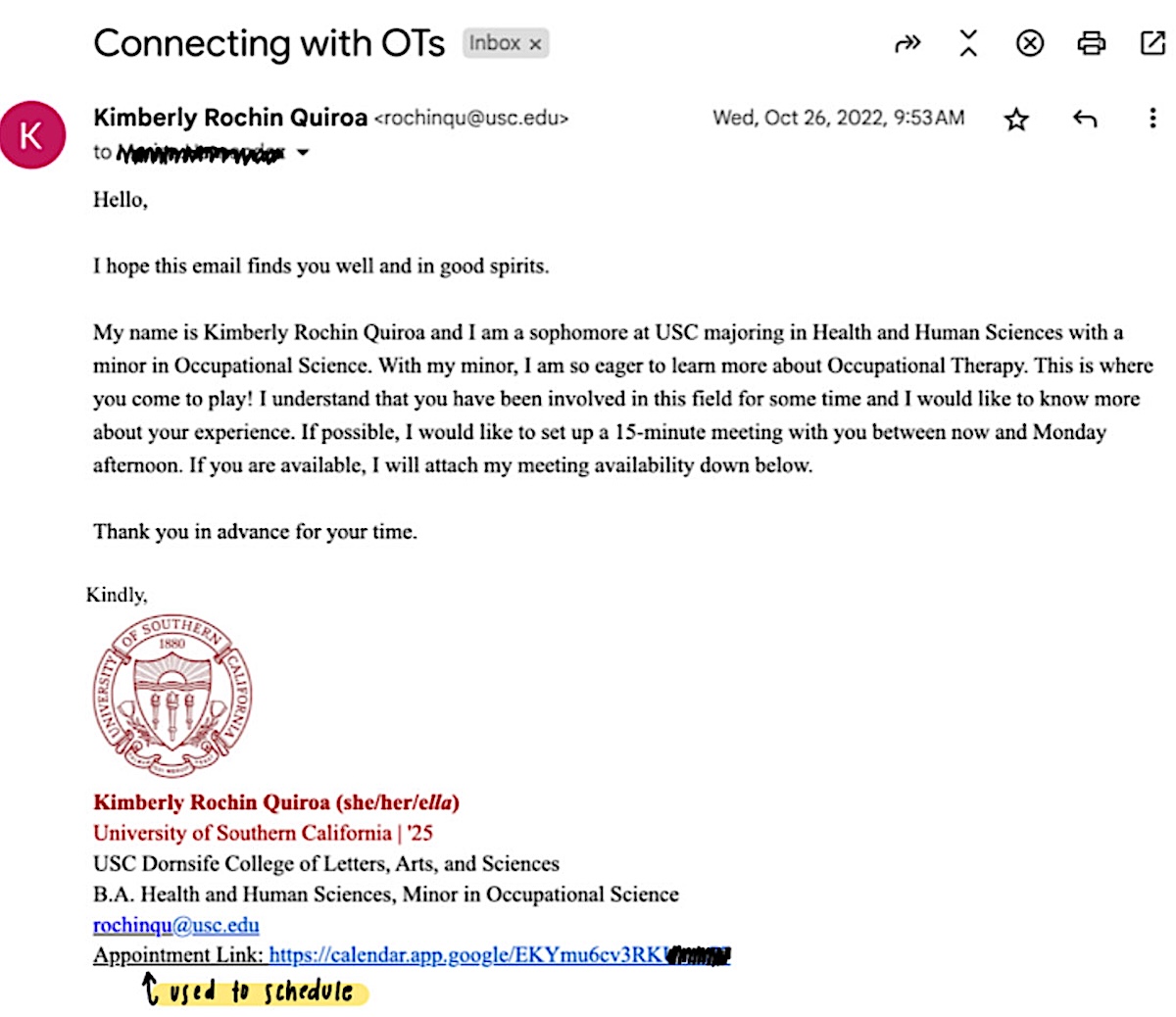
Example outreach email
4. Be Okay with ‘No’ and Flexible with Schedules
Professionals are busy, so don’t be discouraged if someone can’t meet immediately. Respect their schedule and offer alternative times. Patience and flexibility go a long way in showing your appreciation for their time.
5. Scheduling
Offer specific times you’re available to make scheduling easier. Once you’ve confirmed, show up on time and bring prepared questions. If you’re juggling multiple meetings, use a scheduling tool to streamline the process. It keeps things organized and helps you avoid double-booking — showing that you value their time and your own. I use the “Appointment Schedule” feature on Google Calendar. Not only does it make scheduling easier, but I have also received several compliments about my organization!
6. The Meeting . . . OooOOoo
There’s no need to be nervous; just relax and enjoy the conversation! If you’re meeting virtually, ensure you’re in a distraction-free environment with reliable internet and present your best self. I find it helpful to jot down a few bullet points of topics I’d like to discuss; keeping them brief ensures the conversation feels natural (remember: it’s not an interview!).
If you’d like to take notes, let the professional know beforehand. This way, they understand you’re focused on the conversation and aren’t multitasking. Small steps like these can help create a comfortable environment for a productive meeting.
7. Follow Up with a Thank-You
Always follow up with a thank-you email or note. It’s a simple yet impactful gesture that reinforces your appreciation and can leave a lasting positive impression. If you would like to continue connecting, indicate that in the email.
8. Final Thoughts
While these tips have worked well for me, remember that each connection is unique, and there’s no one-size-fits-all approach. Building meaningful relationships in the OT community takes time, patience, and a willingness to adapt. Be open to learning from each experience, and don’t be afraid to try new approaches. So, go out there, make connections, and enjoy learning!
⋯

My OS Minor Recommendations ⟩
November 13, 2024, by Cara
Classes Life Hacks School/Life Balance
Spring course registration is already underway, and if you’re still on the hunt for classes to fill up your schedule, you’ve come to the right place! Whether you’re considering a minor in OT or just looking to create a healthier and happier lifestyle for yourself — here are my recommendations.
OT 101: Caring for Your Self: Engaging in Healthy Habits and Routines
OT 101 is all about YOU! This course helps you learn about self-care practices to incorporate in your everyday life, like mindfulness, setting goals, and time management. Throughout the course, I was paired up with another student for weekly meetings where we reflected on our self-care experiences and feelings. Sometimes we did activities together, like yoga, drawing our breath art, or eating. It was a great experience that helped me improve self-awareness and also built a lasting friendship. Since taking this class, I’ve realized how self-care is not a luxury — it’s a necessity for overall wellness. I’ve noticed improvements in my productivity, calm mindedness, and greater self-acceptance by making time for myself. College can often feel like an endless race where we neglect our health and personal needs, but taking time for self-care can make all the difference.
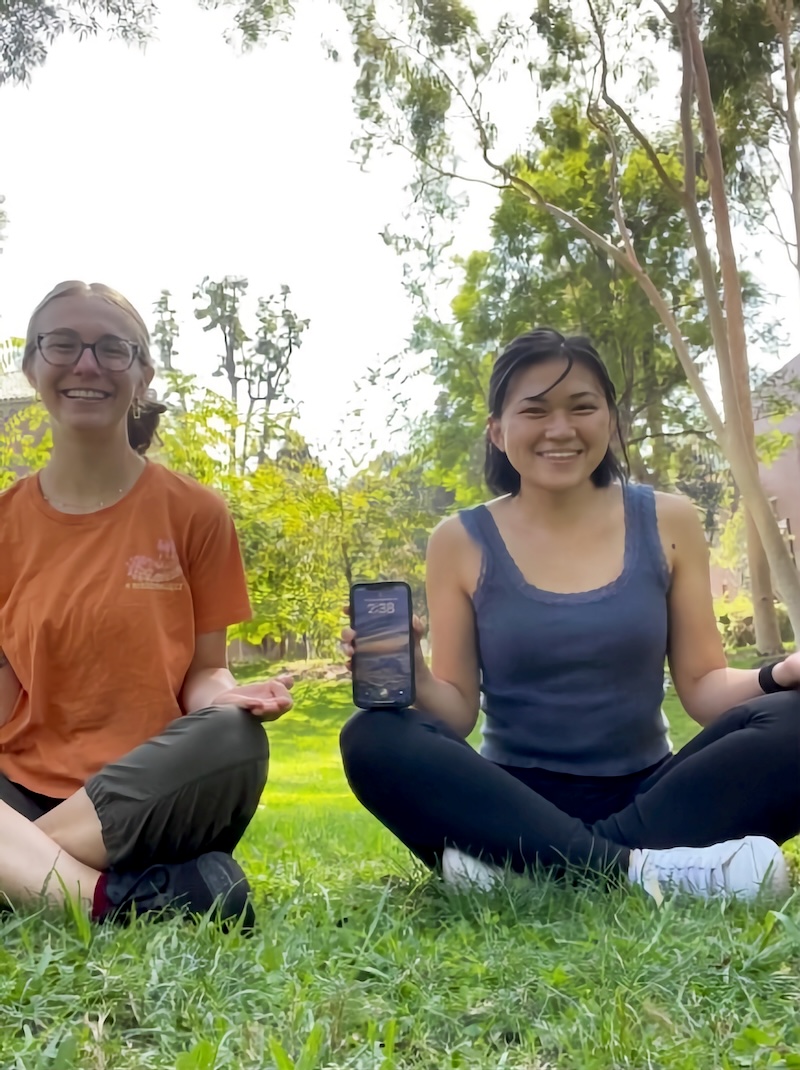
Me and my partner, Mahalia, doing yoga!
OT 251: Across the Lifespan: Occupations, Health, and Disability
In OT 251, I learned about how people grow and change as they go through life and how this affects the activities they find meaningful. We explored human development by looking at different factors like biology, psychology, society, and culture, and how these all connect to shape what people are interested in and value in their lives.
What made this class really fun was the emphasis on building a positive and engaging learning community through peer learning. I often worked in groups on case studies, role-played different stages of development, and did discussions where my group mates and I reflected on our development and how it affects what we do. I really connected with my peers through both our shared experiences and differences, deriving new insights on how development is nuanced. And I still keep in touch with them to this day!
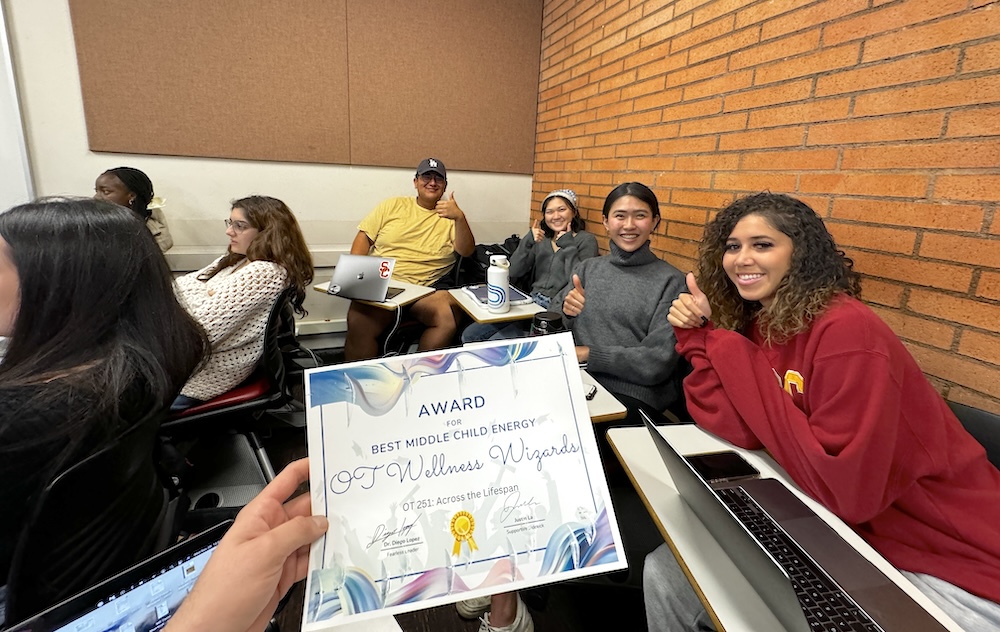
At the end of the semester, my group and I, called the “OT Wellness Wizards,” received the award for “Middle Child Energy.”
OT 340: Animal and Human Interconnection in Daily Life
If you love animals, OT 340 is a must! This course explores the relationship between humans and animals. I learned about K9s, therapy dogs, foster animals, among many others. Occasionally, some furry friends came to visit too. As part of the course curriculum, I spent 8 hours interacting with animals to further understand how humans and animals affect one another. I volunteered at a local shelter, walking German Shepherds for two hours each week. The experience was rewarding, teaching me about humility, compassion, and loyalty. I also found it amazing how animals still love us no matter how we treat them, and continue to persevere to live a better life than before. If that doesn’t convince you, I don’t know what will!
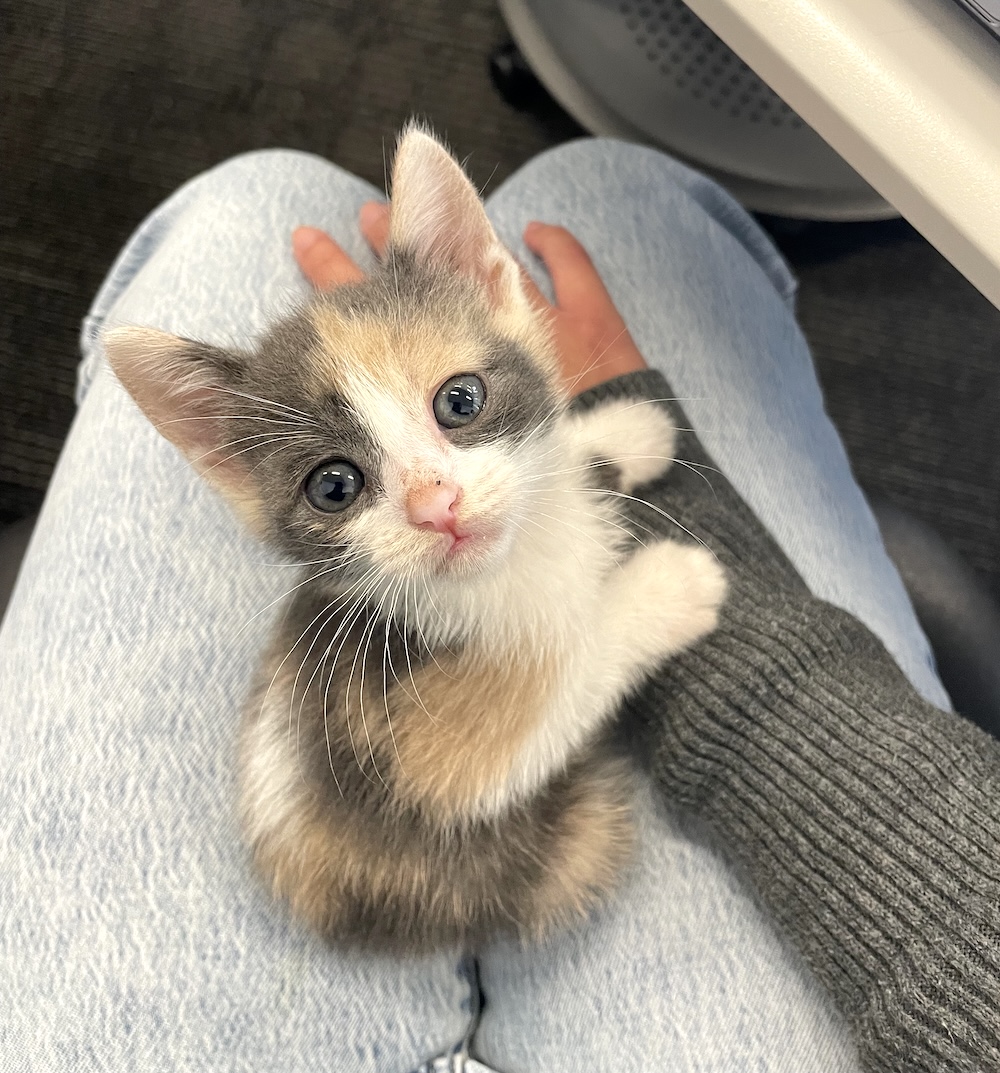

These courses are just a taste of what the OS minor has to offer, and I encourage you to consider them as you finalize your spring schedule. They will deepen your understanding of both yourself and others while providing practical skills you can apply in your everyday life. Check out our other OS courses here!
⋯

How to Find Scholarships (yes, you qualify!) ⟩
November 5, 2024, by Avery
Admissions Life Hacks School/Life Balance
Let’s be honest — education is expensive, especially at USC. That first time you open your financial aid report can be scary and overwhelming. The weight of potential debt and student loans is daunting, and for many of us, staying in school requires tough sacrifices and working multiple jobs just to make ends meet.
One thing that many students don’t realize however, is just how much free money is available to them in the form of scholarships! I’ve heard it all:
“Oh, I don’t think there’s a chance I would actually win the scholarship.”
“I didn’t realize that I qualified!”
“Wait, I didn’t know this many scholarships were out there!”
“I don’t want to take the time to apply when I could be doing other things or just working a job instead.”
In reality, there are numerous independent organizations that WANT to give you their money so that you can pursue your education. Sometimes, it just takes a little digging to get there! I’ll be honest, taking the time to write the essays, figure out the deadlines, and get letters of recommendation is time consuming. This can feel overwhelming and exhausting, especially with the constant demands of schoolwork as a full-time student. However, at the end of the day, the rate of return on these awards is HIGH. Let’s say you spent 3 hours applying for a $500 scholarship. That equates to earning over $160 an hour. Now imagine if that is a $1,000 application? $5,000? It quickly begins to feel like the time applying for scholarships is being much smarter spent than working a few extra hours at a minimum wage job.
So, where to start? I like to begin by researching scholarship opportunities specific to the area where I am from. While many of these local scholarships are only available for high school seniors, I was really surprised to find out my freshman year that quite a few of them have money available for those already in college as well. These awards are great as they are designated only to a specific area or field, meaning less people can apply = you have a better chance of receiving the money.
Now let’s look towards USC specifically. To begin, when applying to USC (undergrad or OT school), be sure to hit that November 1st EA deadline so that you can be considered for the large merit-based scholarships that are available.
The Chan website has links to resources of external scholarships. The list is long, which means there have to be at least a few you qualify for. My advice is to open a Google Spreadsheet, make columns to label the due date, amount, name of award, link, and basic things needed to apply (essay, letter of rec, transcript, etc). Then, go through every award and add any to your spreadsheet that you meet the criteria to apply to. This will keep you organized and will help to not let any deadlines sneak up on you.
![]()
Here is an example of what my scholarship tracker spreadsheet looks like
Chan has a page with resources for their internal scholarships. Add these to your spreadsheet as well.
USC also has several scholarships for those engaged in unpaid research. Check out Dornsife’s SOAR-SURF-SHURE scholarships, as well as Chan’s Occupational Therapy Student Research Fund. These can be incredible opportunities to learn and be involved in something that interests you academically, add to your professional resume, and get ‘paid’ simultaneously.
Next, put together a list of companies you have ties to. Think about places you work, shop, where your family and friends work, where you do your banking, non-profits you volunteer at, etc. There’s a good chance one of these organizations has an annual scholarship award.
Finally, many scholarship search engines exist such as scholarships.com and fastweb.com, where you can filter your search based on your area of study and demographics.
Keep track of those deadlines, and happy applying!
⋯

From Worker to Student: A New Occupation ⟩
September 26, 2024, by Tanya
Beginnings and Endings Community International Life Hacks Living in LA School/Life Balance
It is week 3 of school and perhaps with the exploration of Occupational Science, it made me reflect about the current journey I’ve chosen to embark on; a new occupation. I am no longer a working adult but one who is back in school — an adult student. It has been approximately a month since I said goodbye to the familiar, the known and the expected. Things are no longer as familiar, and navigating through this change has not been the easiest, to say the least.
I have stepped into the unknown and the unfamiliar in the decision to pursue the Post-Professional Master’s degree here at USC Chan, and if I were to use the Person-Environment-Occupation (PEO) Model (Law et al., 1996) to frame my life, you could say that I am still learning to maximize the fit to attain the same occupational performance I had back home. There is not just a literal change, in the physical change in environment, but also a change in my social environment. Social supports that I could turn to immediately had a 15 hour time difference. Even though this is not the first time living alone in a foreign country, it does not get any easier. There are some days I still get teary looking at pictures or Instagram videos and wish I could teleport home to be part of a special event, to comfort a friend or just to get a physical hug from a loved one. Leisure activities which I could engage in frequently are harder to access as I do not drive, or are things that I could not bring over (e.g., my sewing machine).
Even the most simple things require unlearning and relearning — take the metric systems — I am still learning how to convert Fahrenheit to Celsius, Pounds to Kilograms and Miles to Kilometres. It does get better with practice and of course, consulting with Google Converter, especially when I am at the grocery store, has been such help to me. Exploring the transportation systems might be a little tricky, but I am thankful that I got the chance to explore with my course mates, who are becoming a different sort of support system.
Having a new occupation as a student comes with new expectations and responsibilities. I used to read journal articles that I received from my monthly BJOT subscription or when I was reading up on the evidence of interventions that I would like to use. However, being a student means reading and trying to synthesize the contents of the articles for each module that you take. Living alone also means that that are other things you need to manage and set aside time for, such as meal-prep, household chores, figuring out how the dryer works and grocery runs.
Here is another picture of us on our longest day of classes and testing out a classmate’s new digital camera
Though the Occupation and Environment has changed, one thing that remained constant is the Person (that’s me). The changes might seem overwhelming initially but your abilities that enabled you to navigate the challenges, difficulties and new seasons in your life in a place of familiarity and comfort do not change amidst the change in the environment. The routines that you have created for yourself back home can also be replicated here — it just takes a little time to figure and analyse what is better and suitable. I’ve resumed my curiosity in cooking and explored the different dishes and cooking hacks on social media. This has not only provided me with affordable and delicious meals, but it has been a nice and relaxing activity and a way for me to connect with my housemates.
Being a planner, I have plans to crochet and hit the gym with my house/course mate Kate — we will get to it soon! Being away makes you grow as an individual as you reflect and learn to see things from a different perspective — who knew that just having dinner and chatting by the pool with friends is something so enjoyable and refreshing, an activity that I hope will be part of my new routine. Change is hard but it can also be an experience that will shape, develop and make you a better OT as you view things from new and different perspectives. It is also important to be intentional, not just here, but with the people back home, technology in this case is truly a blessing. Being 8811 miles away does feel shorter with the texts and calls.
One thing I am thankful for are my course mates, they make home feel a little less far. My new social environment, but one I am thrilled to share the remaining year with as we learn, laugh and eat together.
Here is a photo at the end of the first week of school with some of my coursemates and housemates. What is missing from the photo is the food people cooked — amazing cuisine from Taiwan and Philippines!
Stay tuned if you are interested in finding out what my remaining year will be like as a new adult student — I personally know it will be an amazing one and one that I will proudly say that I have maximized the PEO fit at the end of it.
Reference
Law, M., Cooper, B., Strong, S., Stewart, D., Rigby, P., & Letts, L. (1996). The Person-Environment-Occupation Model: A transactive approach to occupational performance. Canadian Journal of Occupational Therapy, 63(1), 9–23. https://doi.org/10.1177/000841749606300103
⋯






